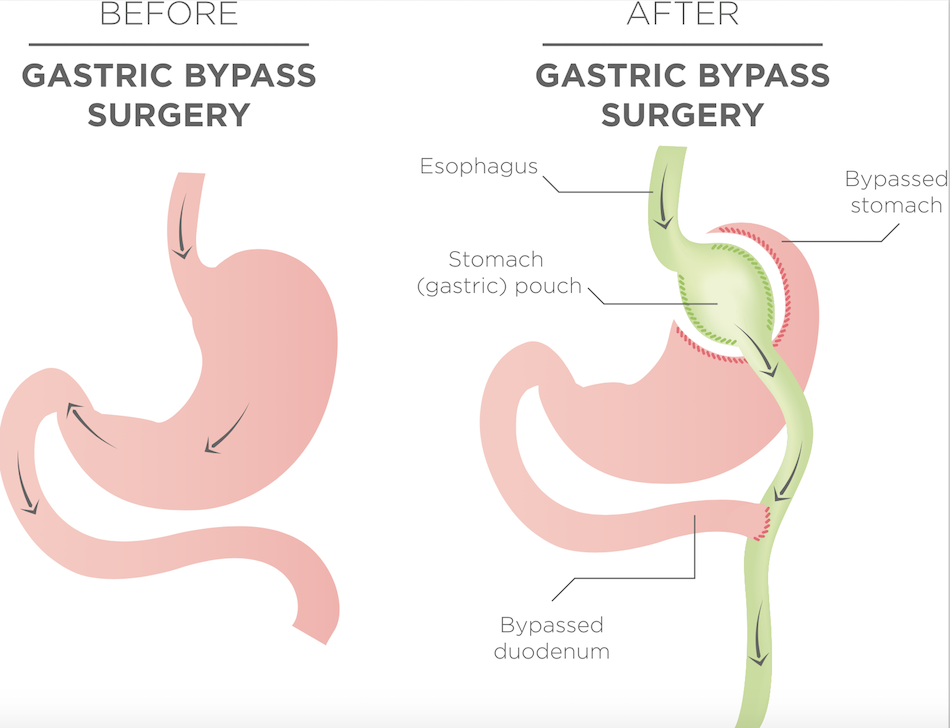The gastric bypass procedure consists of reducing the volume of the stomach and modifying the food circuit.
Food no longer passes through the stomach and the upper part of the digestive tract, it goes directly to the middle part of the small intestine.
The classic gastric bypass technique is the Roux-en-Y one, developed by the Swiss surgeon César Roux.
Bypass surgery is reserved for patients with so-called massive obesity and a BMI (body mass index) greater than 40 and only when other non-surgical weight loss methods such as diet and exercise have failed.
Surgery may be recommended for patients with a BMI between 35 and 40 if other problems such as diabetes, high blood pressure or osteoarthritis are combined.
The bypass should lead to a very significant weight loss of about 5 kg per month, during the first 6 months, then a weight loss of 2 to 4 kg per month.
Bypass is a complex intervention and eating habits must be changed.
Operational indications:
• Patients with a BMI > 40 kg/m2
• Patients with a BMI between 35 kg/m2 and 40 kg/m2 associated with at least one comorbidity that could be improved after surgery (diabetes, osteoarthritis, cardiovascular diseases)
• Previously well-informed Patients who have been evaluated.
Duration of hospital stay
1 to 3 days.
Monitoring required after the intervention.
Average length of stay
2 weeks.
The surgeon will have to agree that the patient can fly again.
Flying can increase the risk of phlebitis.

Every year, nearly 11 million patients go abroad in search of medical care. At MEDICAIM, we provide our patients with access to the best hospitals and doctors around the world. Contact us to learn more about your treatment options.
Ask for your free quote abroad
Start your medical stay by requesting a quote. Our customer service department will help you find the clinic that best suits your needs and get you a quote.
The patient will have to undergo various tests and examinations before going to surgery as well as follow a diet. The surgeon will recommend that the patient stops all medication and stops smoking. The patient should be fasting from midnight the day before the operation.
**The preoperative check-up **:
• Biological assessment
• Abdominal-pelvic ultrasound
• Gastroscopy
The operation is performed under general anaesthesia by laparoscopic surgery, using 5 scars of 5 to 15 mm in the upper part of the abdomen, allowing the introduction of a camera, various instruments, and the clamp for the gastric section.
The procedure usually lasts from 2 to 3 hours. It consists in cutting off the upper part of the stomach, thus creating a small gastric pouch. This is an irreversible procedure. On the small pocket corresponding to the new small stomach will be sewn the small intestine thus making a bypass i.e. a short circuit.

After the procedure, you will spend a few hours in the recovery room, then be taken back to your room.
Pain medication will be administered to you through the vein.
A chest tube is placed after the operation.
The day after the operation:
• Resumption of a progressive diet respecting a specific nutritive program;
• The diet should include 2 snacks and 3 meals to avoid vomiting;
• Put in a sitting position by a physiotherapist;
• Initiation of oral pain treatment; withdrawal of infusion
• Scar monitoring.
Nutritional monitoring must be regular (weekly and monthly)
The efficiency of the bypass is remarkable with a loss of more than 50% of excess weight in the first year.
Biological follow-up is important at 1 month, 3 months and 6 months to eliminate or correct any vitamin deficiencies.
Potential risks:
• immediate complications: perforations, bleeding
• scar infections
• stomach ulcer
• stenosis (narrowing) revealed by vomiting
• vitamin deficiencies
• phlebitis
• frequent risk of dumping syndrome: discomfort (nausea, cramps, sweating and diarrhea) occurring after too much and/or too fast absorption of sugars.
MEDICAIM takes care of the follow-up on a case-by-case basis. www.medicaim.com
MEDICAIM is looking for the best specialists for you and we will offer you several renowned doctors.
MEDICAIM organizes your entire stay for you: post-operative nursing care, biological follow-up, therapeutic, nutritional and psychological support.
Any additional questions? Ask your MEDICAIM doctor about it: careteam@medicaim.com
Some needs and conditions are more complex than others. In case of doubt, please send us additional information to establish a customized quote.
Ask for a quoteCertains besoins et pathologies sont plus complexes que d’autres. En cas de doute, faîtes-nous parvenir des informations complémentaires pour établir un devis sur-mesure.
Demander un devisEntrust us with your medical file and it will be examined by a specialist doctor. The goal?
Allow you to evaluate all your treatment options.